Blog 10

Throughout the duration of this course, the biggest progress that I have made is being able to more effectively apply what I’ve learned in Cross-Cultural into other branches of psychology. Along with this course, I am taking part in the Integrative Learning course, allowing me to see how integrated all the branches of psychology are. The course objective that I believe is most evident now that the course is coming to an end is that I have gained a better understanding of how important it is to learn from other cultures; that way, I can better understand them. Second, I believe I have developed my critical thinking skills. I believe this will greatly benefit me in my professional career. Finally, if I took this course again, I would love to really focus on the textbook reading in order to better apply what I learned into a real-world setting.
Blog 9

I have learned so many things in this course. But I think the three biggest things that I’ve really loved learning about was the Five Factor Model, how much my values mean to me, and how much I want to travel to another country. Firstly, I have always loved learning about personality, others and my own. So it comes as no surprise that I’ve loved learning about all the differences in personalities between cultures. Second, as I’m learning about these countries, and about my own, I can see where I fit in with my own values. Last, I have learned that I am missing out on exploring all of these different cultures. And I can see how much of what I learned in Cross-Cultural psychology fits into other psychology courses, like psychology of Adolescence. It has been very interesting to see how the self-determination theory relates to cross-cultural psychology as well as adolescent psychology. In turn, I’ve also been able to relate these ideas to the Integrative Learning Community as well.
Blog 8

Personally, I have never left the country. I’ve never gotten the opportunity to experience cultures that are very different from my own. And while, I know that there are different cultures that I can experience right here in America, I have yet to notice any differences in emotions. I don’t know if this is because of how little I have been exposed to others cultures, or because I just do not pay attention. I had noticed thought, but hadn’t really thought about how different cultures use different emoticons. I think that it is just another testament to how diverse and interesting people can be.
Blog 7

Fairy tales inevitably will reflect specific traits of culture, whether they meant to or not. Like with anything, cultural values and norms are so ingrained into society, that the authors, writers, directs, etc, may not even realize how standard the stories are. Beauty and the Beast provides a good example of America’s movement for equality, especially women’s rights. Or even when the original author of Beauty and the Beast was penning her tale of beauty within, certain cultural norms can be seen. For example, that people typically look only on the outside to judge character. We can see with other fairy tales as well that were written hundreds of years ago, which often feature demure princesses, who are saved by the dashing prince or knight. This was how women were typically viewed. It stands that when recreating a story, or creating a new one, culture norms and values will be present.
Blog 6
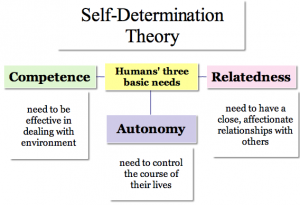
There is no doubt that I need autonomy, relatedness, and competence in my life. Probably, the one that I need the most would be autonomy. I can so easily get discouraged when I can’t plan for every possible situation, or if I have to let anyone else take control. This is what makes group projects so hard for me. Luckily, this course, and many others, has put me in situations where I do not have complete control, and because of this, I’ve begun to mature. But my highly autonomous lifestyle is part of the reason why I can excel academically.
Competence is the second most important psychological need in my academic life. For the most part, every project, assignment, test, and homework that I do is done to the best of my ability. However, when I do not feel competent, I can become discouraged, leaving the assignment until the last minute.
Lastly, I crave relatedness. I had not realized that this was even a factor in my life until the past year. I began to realize that if I wasn’t doing work for anyone else, then what is the point? I need relationships with others because I can’t do this all on my own. No matter what the autonomous side of me tries to say. I think part of the reason that relatedness is so important to me, and has gone unnoticed until recently, is that I was homeschooled. My parents were always involved in my academics, and they gave me healthy view of learning. These three factors all work together in my life, giving me the motivation to be the very best I can at college.
Blog 5
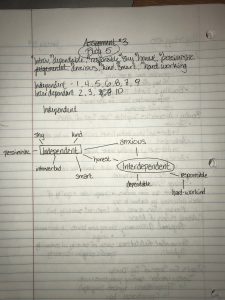
I am introverted
I am dependable
I am responsible
I am shy
I am honest
I am pessimistic
I am anxious
I am kind
I am smart
I am hard-working
Above are the first 10 adjectives that came to my mind that I would use to describe myself. There are plenty of others, some not so flattering, and some that I may not even realize about myself. What I do know is that a majority of them, 1, 4, 5, 6, 7, 8, and 9, to be exact, stem from a desire for independence. While the others may be interdependent, I am definitely more of independent person. I often feel like I am the only one I can trust to get something done. This is certainly not true, but it is a constant factor in my daily life. And one thing everybody has always called me is quiet. This is true, and I believe many of these traits are just reasons why I am so quiet. But my independence makes a very reliable and determined person.
Blog 4
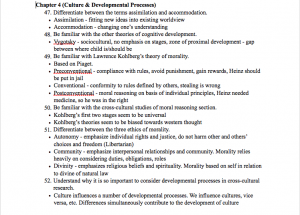
When looking back on my test results, one idea became very clear. A majority of the questions that I got wrong were in the last 10-15 questions. In order to prepare for the test, I utilized the test review by editing the document with answers to the questions. I also would reread any section that the review specifically mentioned. I systematically studied in this way throughout the week leading up to the test. In the days leading up to the test, I would go back over the answers that I had written out in order to solidify the concepts into my mind. Overall, this method was very effective for me, personally.
While I began doing the test review on the later side, I was not pressed to get it done before the deadline. I had a certain amount of questions to do per day in order to get through all fifty-three. However, because I felt this false sense of time security, I began putting off questions for the next day, and the next, and the next. As the procrastination took its toll, I was not able to study Chapter 4 as thoroughly. Therefore, a majority of the points that I lost came from that section. I learned from this first exam that I have the correct method of studying: read the chapter, power-points, test review, reread important sections; what I need to focus on next time would be more effective time management.
Blog 3
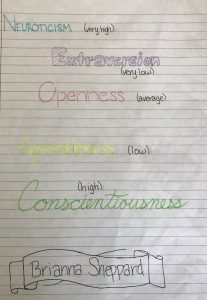
Between my cross-cultural and psychology of adolescence class, I have read a lot about the Big Five Personalities in the past few weeks. Personally, I had a pretty good idea what I would scores for the Neurotic and Extroverted categories, very high and very low, respectively. I am very easily throw in times of high stress or any change of plan. In addition, I love my alone time. However, I was unsure what the other three categories held for me. Turns out that I am high in conscientiousness compared to others. The other two, openness and agreeableness, came as a bit of surprise. Openness-wise, I am average. Honestly, if I were to guess before I did the scoring, I would’ve said that I was in the lower category. As an ISTJ on the Myers-Briggs personality scale, I am considered logical and dedicated, very set in my ways. As to agreeableness, the test describes me on the low-side of agreeableness. Personally, I would love to have scored higher. I do think that I am less skeptical about people than what I scored, but I think that it may have been a case of response bias and being overly critical of myself.
Blog 2
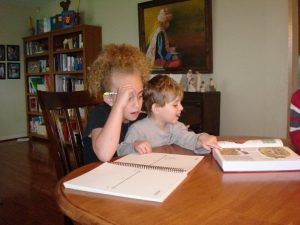
Family is an enormous part of my life. I think that a reason for this is because I was homeschooled from Kindergarten right up until I graduated. Because of this, I spent a lot more time with my parents and siblings then other kids were able to. Not only did being homeschooled eliminate time spent at school, but I also did not have homework, because all the work I did was already at home. I decided to go onto get a higher education because my mom helped cultivate a love of learning while I was younger. In addition, I took outside classes for higher-level courses (lab sciences, writing, math), and my teachers encouraged me to go to college. I do not think I would be where I am today without the encouragement and love that I received from my family everyday.
Blog 1
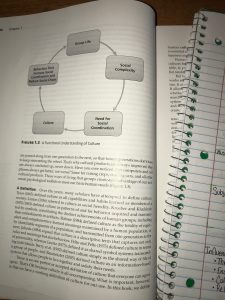
I hope that during the duration of this course, it will benefit me by expanding my horizons. This is another branch of psychology that I am glad I have the opportunity to explore. Ultimately, the skills that I need to interact with other cultures will begin to develop as I learn from cross-cultural psychology. Professor Younkin has proposed big expectations in her syllabus, but I am ready to tackle them head-on. I would say that my academic weakness is critical thinking, which is crucial in psychology. But after the first week, I could tell that I would get the opportunity to develop my critical thinking skills. In addition to this, I am excited to get into the application and research portion of cross-cultural psychology. Finally, I am ready get a better understanding of culture, not just in the psychological aspects, but overall.